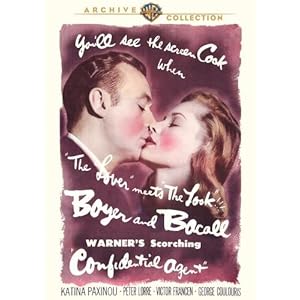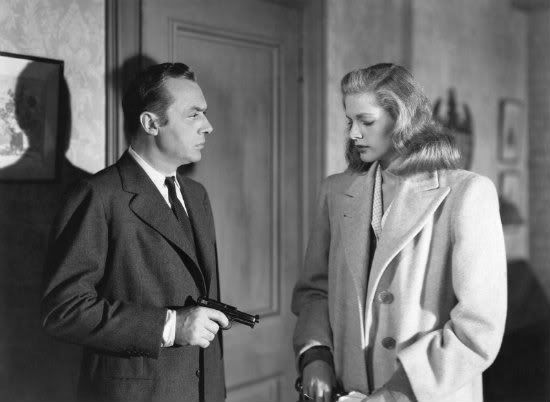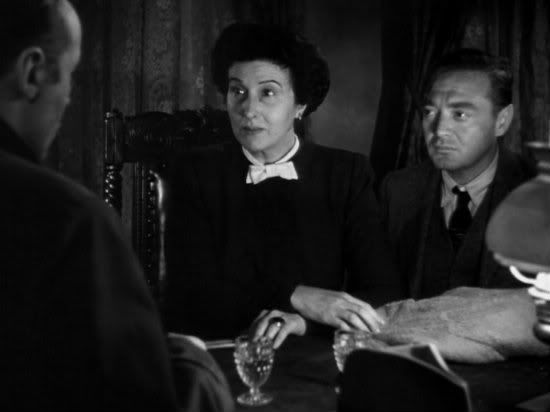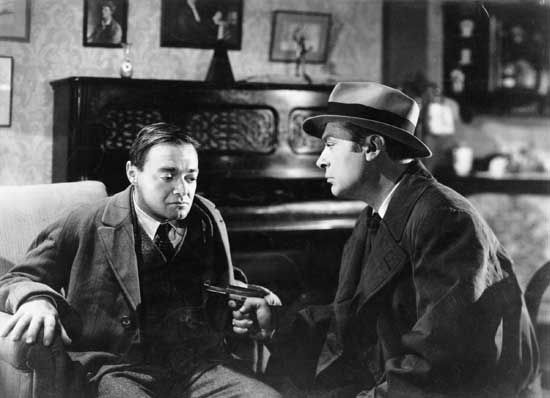
Confidential Agent arrived rather late in the game for a war propaganda films (which is not meant at all negatively, by the way). It hit theaters in November of 1945, roughly six months after V-E Day. Perhaps because of this, or maybe just because it’s adapted from a Graham Green novel, the film is rather sophisticated and somewhat cynical, as befits a film featuring characters involved in the Spanish Civil War.
One of the oddest realizations was that star Charles Boyer was meant to be playing a Spaniard. Despite some plot awkwardness, I had assumed he was playing a French volunteer fighting on the Republican side. I was actually shocked when about 20 or 30 minutes in I figured out he was indeed supposed to be Spanish. I mean, Boyer about the Frenchiest French guy this side of Maurice Chevalier.
On the other hand, Peter Lorre is also playing a Spaniard (!), and Lauren Bacall is playing an Englishwoman (!!). It’s hard to think of an actress that sounds or acts less British than Brooklyn native Bacall. You’d think they’d at least have given her a ‘raised in America / Canada’ fig leaf, as they gave Lon Chaney Jr. in The Wolf Man.
They don’t. Bacall received bad reviews for her performance here, a film she didn’t want to do and subsequently always felt hurt her career. I suspect her obvious inappropriateness for the part was a good part of this. Personally, I didn’t think her acting here was that bad, although maybe I just like Bacall.

Boyer is a man just arriving in England. He’s followed by Currie (veteran heavy George Coulouris), an aristocrat agent for the Spanish Nationalist government. Boyer is on a mission of some sort, and Currie is clearly his opposite number. Currie is the standard fellow who would prefer to use bribery to more violent tactics, but is stymied in this by a stalwart hero. Again, though, it’s a note of the film’s comparatively sophistication that he isn’t painted all in black.
In the same fashion, and again presumably taking it’s nod from Greene’s novel, the picture doesn’t purely cast the Republicans as 100% good guys. When Currie tries to dissuade Boyer from attempting to finish his mission, he points out how as an artist and intellectual Boyer doesn’t necessarily face a happy future should his side win.
This is a markedly realistic view of Communism for a WWII era Hollywood movie, which otherwise (for obvious reasons) was pretty rah rah after Hitler forced Stalin to fight with the Allies. Orwell, however, was not the only foreign volunteer to join fight against the Spanish fascists, only to return home with a far more jaundiced view of the Communists.
In any case, this rather vague couple of lines makes this film more accurate about Communism than nearly anything Hollywood’s put out over the last several decades. Admittedly, that’s kind of damning with faint praise.
Needing to get to London immediately, Boyer accepts a ride from callow young heiress Bacall. As the film is set in 1937, war hasn’t come to Britain yet, and the film ably communicates the difference in attitude between those who have only heard about such things from a distance, and those who have actually lived through them. When Bacall pries some small pieces background information from her traveling companion, she knowingly assumes he’s being “melodramatic” in an effort to impress her.
After their trip gets delayed, Boyer runs afoul of Currie and his brawny henchman, taking a fairly realistic beating. (Of course, you’re not going to bruise up Boyer’s face for the whole movie, so he still cleans up pretty good.)
This sets up a nice bit later in the movie when Bacall, still denying the possibility that he’s not just acting mysterious to get in her pants, slaps his face. She is shaken when this draws blood, as her slap has reopened the split lip he received earlier. Faced with actual evidence of violence, even on such a small scale, cuts through her cynicism. It’s a nicely judged moment.
Boyer needs any friend he can get. His two contacts in Britain, Lorre and Boyer’s eventual London landlady, decide to sell him out to Currie. They figure, or at least tell themselves, that Boyer will probably sell out the cause himself, so it might as well be they who profit. Again, this such blasé corruption is pretty rare for a film of this era.
This is one of Lorre’s Elisha Cook Jr. roles, in which he plays a mild little man clearly in over his head. He and his landlady associate (a more genuinely villainous type) demand the MacGuffin Boyer carries with him. They don’t realize that he’s passed it on to the sweet young girl who works for the landlady.
Eventually things spiral out of control, and Lorre is clearly unprepared for the consequences. It’s a familiar role for him, but then character actors generally specialized in certain types of parts. And as you’d expect, he plays it well, even if it’s not one of the actor’s better showcases.


Boyer’s wife and daughter had previously been killed by the Nationalists, and his growing relationship with the girl in the hotel is quite affecting. Again, though, things are a bit deeper than normal for such a film. Boyer clearly innocently thinks of her as a surrogate daughter. For her part, though, the 14 year old girl, just hitting that burgeoning sexual phase, clearly has vague romantic feelings for him. Needless to say, this isn’t overplayed, but it’s nice shading, nonetheless. And I should note that it’s not at all creepy, as Boyer clearly has no designs on her.*
(*I’m not sure if that’s true in Greene’s novel, though. He kicked the book out during a hotel stay, and apparently slept with the landlady’s daughter while he was there. In the movie, at least, the girl is not the landlady’s daughter, so I can’t be sure how much of his own experiences Greene put in the book.)
Again, as you can see, this is all rather more nuanced than we normally get in this sort of thing, although not quite to the level of The Third Man, also adapted from a Greene novel. Still, like Le Carre after him, Greene wasn’t interested in superman heroes, and Boyer (like Joseph Cotton in The Third Man) proves a rather fallible amateur hero. At one point he’s trying to threaten someone with a pistol, only it’s jammed or something, and to his exasperation he has to keep monkeying with it as he tries to clear it.
I also liked the nature of Boyer’s mission, which proves to be the sort of thing that seems prosaic for a movie plot, but would be a vital issue in actual war. Again, the film has its romantic (in the literary sense) dimensions, but is generally nicely grounded.
And while Bacall was at best serviceable—and again, many critics didn’t even think her that—Boyer is quite good. He brings a nicely world weary quality to the part that sets a nice tone to things. He’d probably seen enough of what had happened to France in the years just previous to make such acting not much of a stretch.
This was a nicely mounted production. At two hours, the film is fairly lengthy for the period, but it’s nicely paced nonetheless. Genre fans will be glad to see George Zucco popping up at one point (not playing a bad guy for once). Composer Franz “Bride of Frankenstein” Waxman provided the score, while James Wong Howe did the cinematography.
The film is available via Warners’ DVD-R on demand service. The presentation is pretty good, if not crystal clear.
